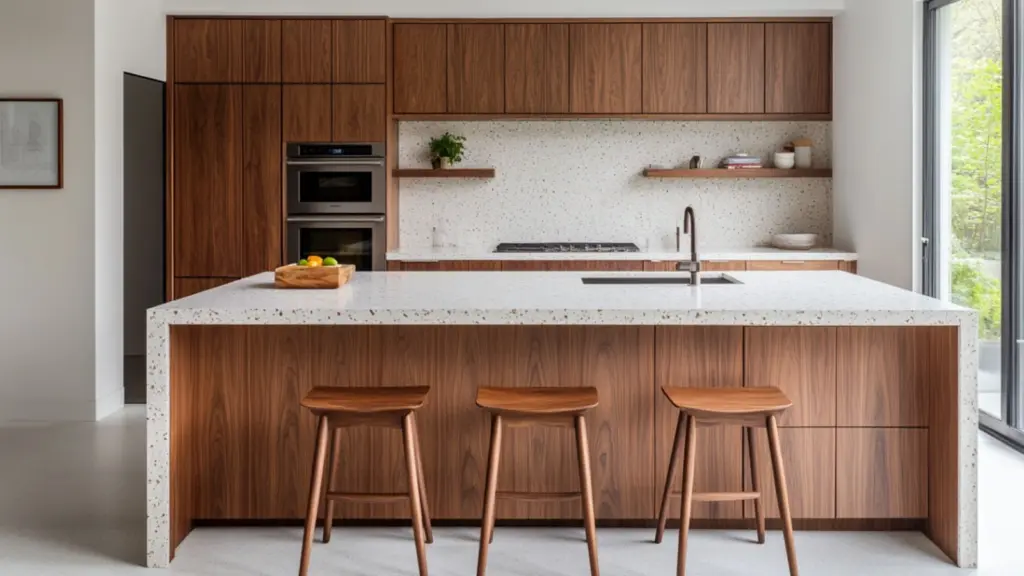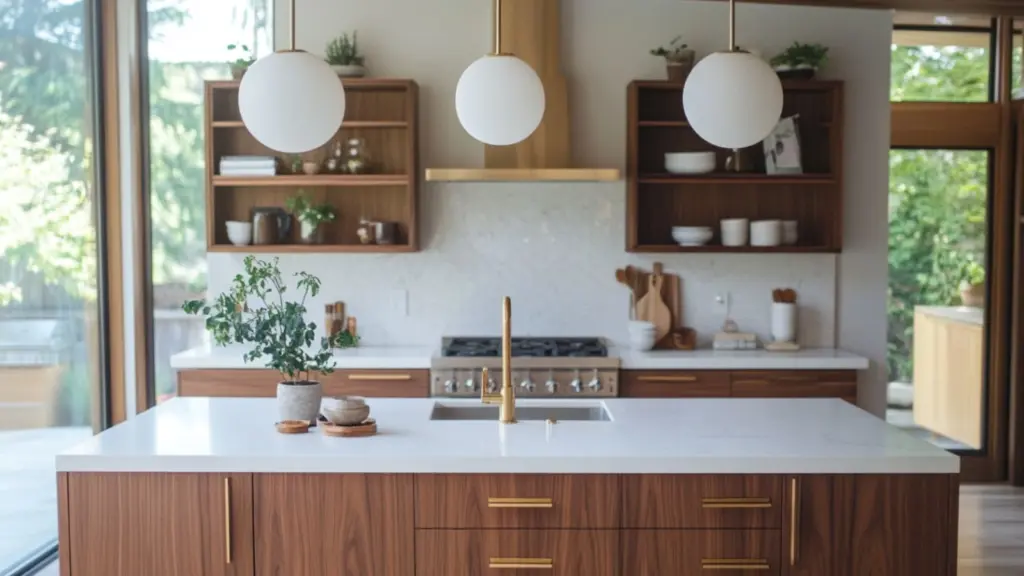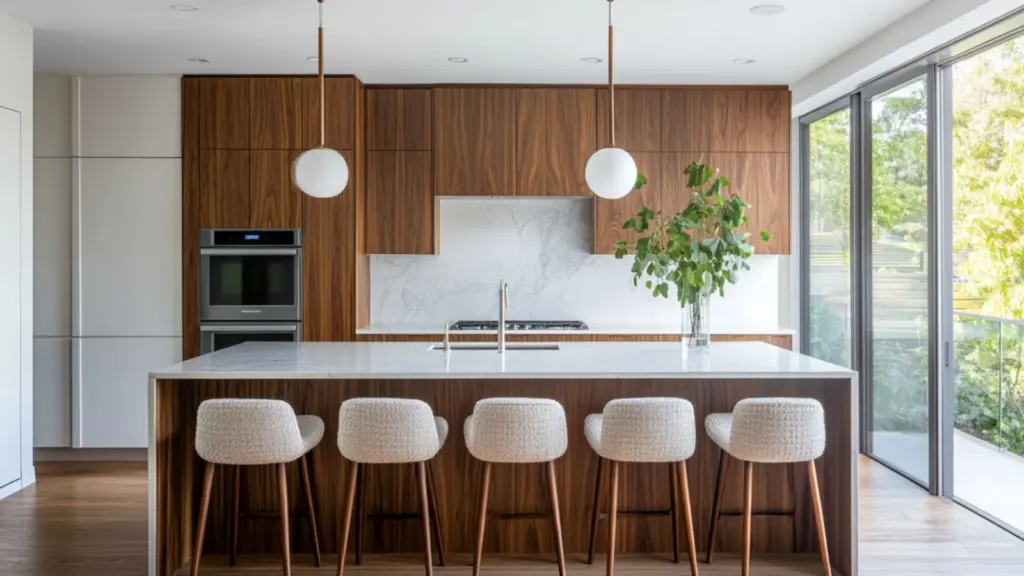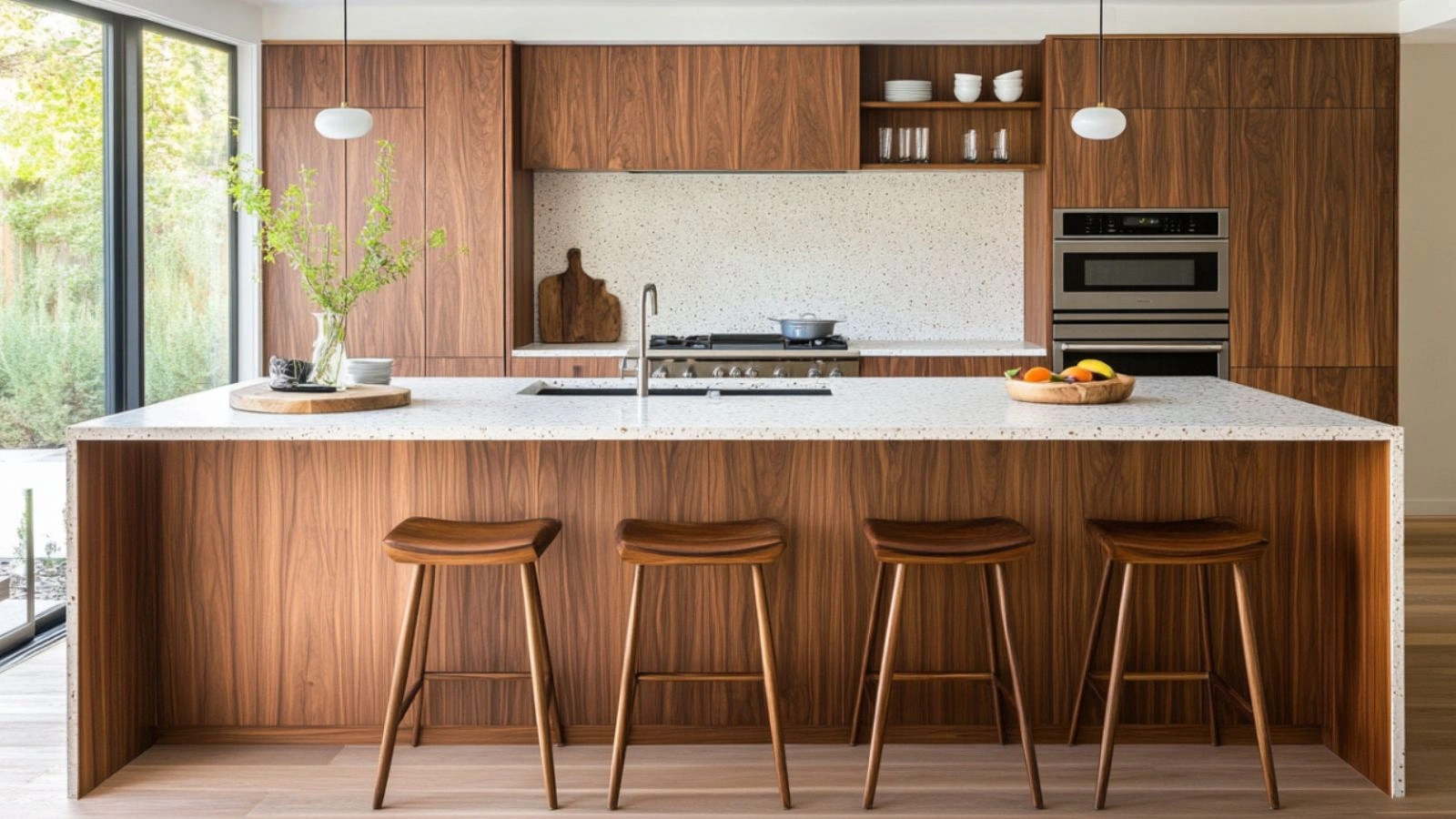Modern Mid-Century Modern Kitchen Island Inspirations: Sleek Design Ideas for Stylish Functionality
Table of Contents
The kitchen island has become more than just a prep zone—it’s the true heart of a modern kitchen. And when that island design draws from mid-century modern influences? The result is a seamless blend of nostalgia, simplicity, and sleek sophistication. Mid-century modern kitchen islands fuse timeless design with 21st-century practicality, creating stunning focal points that ground the room while enhancing functionality.
Characterized by clean lines, warm woods, muted tones, and subtle curves, the mid-century modern aesthetic has been a cornerstone of interior design for decades. According to current trends, the revival of this iconic style continues to grow, especially in kitchens where minimalism meets comfort and craftsmanship.
In this article, we’ll walk through inspiring ways to incorporate a modern mid-century modern kitchen island into your space. You’ll discover materials that work best, popular layouts, creative storage features, and how to balance retro style with a contemporary edge. Whether you’re renovating or dreaming, this guide offers ideas that are stylish, practical, and effortlessly chic.
Key Characteristics of a Mid-Century Modern Kitchen Island

Before diving into design options, it’s important to understand what defines a mid-century modern kitchen island. This design style originated in the 1940s–60s and emphasized form following function, honest materials, and simplicity. When translated to kitchen islands, it becomes a harmonious mix of retro charm and modern-day usability.
Common elements include flat-front cabinetry, tapered legs, integrated storage, and natural materials like walnut, teak, or oak. You’ll also see a preference for soft geometric forms, clean lines, and thoughtfully muted tones like sage, ochre, and ivory.
Mid-Century Modern Island Features
| Design Element | Description |
|---|---|
| Clean Lines | Minimal detailing, horizontal emphasis, no ornate carvings |
| Natural Wood | Warm finishes like walnut, teak, and oak dominate the aesthetic |
| Slim or Tapered Legs | Legs that lift the island slightly off the floor, giving it a furniture-like quality |
| Integrated Handles | Recessed pulls or handle-free cabinetry for a smooth silhouette |
| Contrasting Countertops | Quartz, terrazzo, or matte stone add a refined, modern touch |
While modern interpretations may favor bolder contrasts or metallic accents, the foundational ethos of mid-century modern style remains rooted in balance, craftsmanship, and livability.
Incorporating Natural Wood for Warmth and Character

Natural wood is the cornerstone of mid-century modern design. In kitchen islands, it introduces organic texture and warmth—essential to balancing a minimalist aesthetic with comfort and charm. Walnut is the most iconic choice, favored for its deep brown tones and elegant grain. However, lighter woods like white oak or ash also work beautifully, especially in modern homes seeking an airy feel.
A solid wood base with horizontal grain direction, paired with a waterfall edge or floating top design, creates an island that feels architectural and handcrafted. Some homeowners choose contrasting tones—wood for the base and a matte black or white stone top—for visual interest. Others keep a tone-on-tone look with butcher block counters in the same species.
Popular Wood Finishes for Mid-Century Modern Kitchen Islands
| Wood Species | Characteristics | Best Paired With |
|---|---|---|
| Walnut | Rich, chocolate brown with visible grain | Matte black, white quartz, or brass hardware |
| White Oak | Light and neutral with minimal pattern | Warm gold accents, sage cabinetry |
| Teak | Golden brown and highly durable | Terracotta tones, black or gray stone |
| Ash | Subtle grain, slightly cooler tone | Muted green or ivory palettes |
To preserve the natural beauty of the wood, opt for satin or matte finishes rather than gloss. These finishes enhance grain details while maintaining the understated elegance the style is known for.
Creative Storage Solutions with Sleek Design
One of the best features of a well-designed kitchen island is the opportunity to integrate storage without compromising on style. In a modern mid-century kitchen, this means seamless drawers, handle-free cabinetry, and clever compartments that keep the aesthetic clean and purposeful.
Flat-front drawers with recessed pulls or push-to-open systems are especially popular. If you prefer subtle contrast, leather or wood finger pulls can add a touch of personality. Interior drawers often include dividers, spice organizers, or sliding trays for enhanced function.
Mid-Century Storage Features to Consider
| Feature | Purpose | Design Tip |
|---|---|---|
| Integrated Drawers | Keeps surfaces clutter-free | Match wood tone to cabinetry for a cohesive look |
| Appliance Garage | Hides small appliances while preserving access | Install flush doors with hidden hinges |
| Bookshelf or Display Niche | For cookbooks or ceramics | Face toward dining area to soften the island’s profile |
| Hidden Charging Station | Keeps phones and tablets powered discreetly | Tuck into a drawer or under the countertop lip |
Open shelving on one side of the island can also provide space for styled décor—like stacked dishes, pottery, or vintage glassware—without interrupting the flow.
Stylish Seating Ideas for a Social Kitchen Island

Functionally, kitchen islands often double as casual dining or conversation zones. In a mid-century modern kitchen, seating should complement the island’s clean lines without overwhelming it. The best bar stools are streamlined, sculptural, and thoughtfully chosen to enhance the room’s flow.
Look for stools with metal or wooden legs, upholstered seats in neutral or muted tones, and minimal backrests. Tapered legs and curved seats are nods to vintage design, while materials like boucle, faux leather, or linen offer comfort and sophistication.
Seating Pairings for a Mid-Century Kitchen Island
| Stool Style | Description | Best For |
|---|---|---|
| Low-Back Upholstered | Soft seat with clean shape | Comfort and elegance in open-plan spaces |
| Wood Frame Stools | Tapered legs, curved seat, no back | Retro charm and minimal visual weight |
| Wire or Metal Frame | Thin profile with geometric detailing | A more modern-industrial blend |
| Boucle Counter Chairs | Soft fabric with rounded back | Adds texture and femininity to wood tones |
Keep the space between stools around 6–8 inches for easy access and visual rhythm. If space allows, three stools is the ideal number to balance form and function.
Countertop Materials That Elevate the Design
The countertop is often the most visually dominant feature of a kitchen island. For mid-century modern style, subtlety and texture are key. Skip anything too busy or high-gloss in favor of smooth, matte, or honed finishes that let the materials speak softly.
Quartz and marble are popular choices—especially those with understated veining or soft white and gray tones. Terrazzo, a favorite of the mid-century era, is also making a comeback in kitchen islands, offering speckled visual interest without overpowering the room.
Top Counter Materials for a Mid-Century Kitchen Island
| Material | Description | Style Benefit |
|---|---|---|
| Honed Quartz | Soft finish, stain-resistant | Modern and practical with elegant restraint |
| White Marble | Classic veining, cool undertones | Timeless appeal with natural variation |
| Terrazzo | Speckled pattern, retro flair | Adds texture and mid-century authenticity |
| Butcher Block | Warm wood surface, tactile appeal | Ties in beautifully with walnut or oak bases |
Edge profiles also matter—waterfall edges, bullnose, or chamfered details all lend a retro-modern touch while keeping the surface streamlined.
Balancing Old and New: Modern Twists on a Classic Design
One of the best things about mid-century modern design is its ability to evolve. Pairing classic silhouettes with modern materials or technology creates a space that’s timeless yet current.
Smart lighting, touchless faucets, and integrated appliances can coexist with vintage-inspired stools and brass pendants. Consider using color blocking with your island—pairing a dark wood base with a bright white top or introducing a pop of sage or dusty blue for visual energy.
Modern Enhancements That Still Feel Mid-Century
| Feature | Mid-Century Element | Modern Twist |
|---|---|---|
| Statement Pendants | Globe or cone shapes | Matte finishes, oversized scale |
| Minimal Hardware | Recessed or brass pulls | Finger-touch technology or push-to-open doors |
| Neutral Palette | Earthy tones + whites | Soft matte black or blush accents |
| Mixed Materials | Wood + stone | Add leather, clay, or fluted textures |
With a thoughtful approach, your island can bridge decades—bringing a sense of continuity to your kitchen while still feeling fresh.
Conclusion
A modern mid-century modern kitchen island is more than a design feature—it’s a celebration of timeless style and thoughtful living. From rich wood finishes and sleek storage to sculptural stools and curated lighting, every element comes together to create a space that feels warm, functional, and beautifully composed.
Whether you’re planning a full kitchen renovation or simply updating your island, the mid-century modern approach offers endless inspiration for creating a kitchen that’s both inviting and enduring. It’s a perfect harmony of retro charm and modern-day sensibility—elegantly bridging the past and present, right at the heart of your home.

